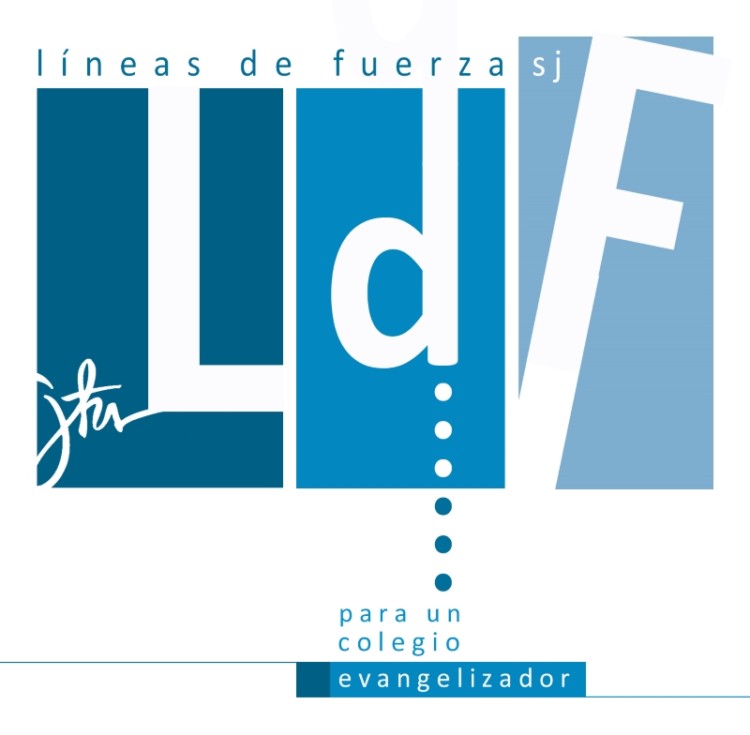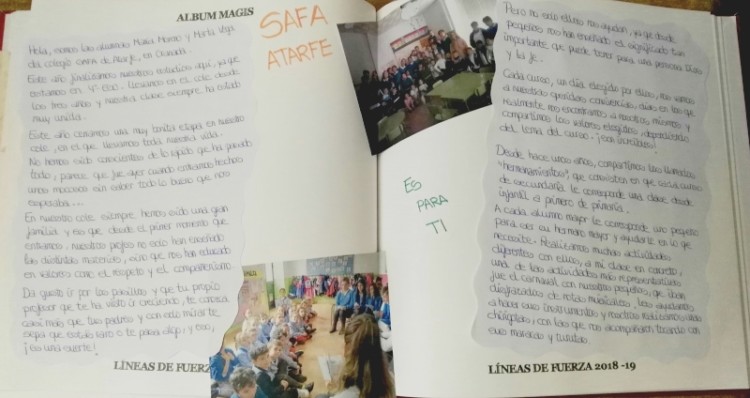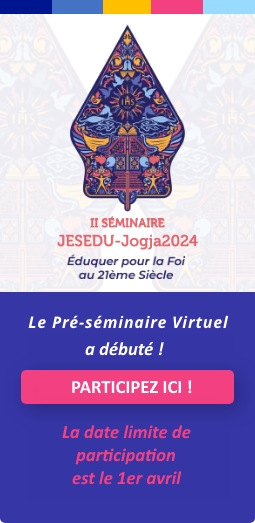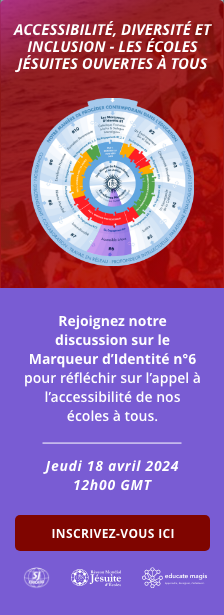For some years now, the Society of Jesus in Spain has been working to create a certain level of pastoral unity in its schools throughout each academic term. As schools have a fixed working programme/curriculum, the Society decided to create specific materials that enrich that program for both pupils and teachers. Schools were already working with materials they had created themselves, but the goal was to unify them with something all of them could work with, while continuing to invite their creativity and respect their individuality.
 Hence, in 2007 a new programme team of lay and Jesuit educators who work as a network for the schools of the Society of Jesus in Spain and in Portugal was set up and was named « Líneas de Fuerza » (literally, « lines of force »), « Guidelines » in English. The team was missioned to put together these “Guidelines”, which also has a second name: « for an evangelizing school » because its work is not only rooted in Ignatian Spirituality but also includes faith-formation activities that focus on the Gospel of Jesus.
Hence, in 2007 a new programme team of lay and Jesuit educators who work as a network for the schools of the Society of Jesus in Spain and in Portugal was set up and was named « Líneas de Fuerza » (literally, « lines of force »), « Guidelines » in English. The team was missioned to put together these “Guidelines”, which also has a second name: « for an evangelizing school » because its work is not only rooted in Ignatian Spirituality but also includes faith-formation activities that focus on the Gospel of Jesus.
The essential element (both as starting point and backbone) is Ignatius of Loyola’s « Spiritual Exercises ». We chose the six parts of the Exercises we considered most suitable for the work with our pupils. The Spiritual Exercises were not specifically written for schools, so we chose what we thought would be most fruitful for our pupils’ faith development. The chosen parts are:
- (1) « The Call of the Temporal King »
- (2) « Principle and Foundation »
- (3) « Contemplation of the Incarnation »
- (4) « Meditation on Two Standards »
- (5) « True Sentiment in the Church »
- (6) « Contemplation to Attain Love »
We think these six central themes provide a good perspective on the entire book of the Exercises. Each part has an Ignatian “key”, which are the following:
- (1) « Magis »
- (2) « To love and to serve in all things »
- (3) « A fire that kindles other fires »
- (4) « To seek and find God in all things »
- (5) « Friends in love/charity »
- (6) « More in deeds than in words »
Each motto has a sub-motto that complements the motto we decide on as the first stage of our work for each school year. This motto is the main element of the campaign and is present in all the materials we develop for each theme. The activities we prepare are intended for the whole school year and are meant to blend in with the activities each school decides to carry out according to their own programs. After completing the six-year cycle a new one begins with the same structure and based on the same parts. Just a quick clarification regarding our methodology, we realize that the « Principle and Foundation » is the gate to the Exercises but, pedagogically, we find it easier to begin « the journey » with the calling of God.
For example, the sub-motto for the next school year is « #Trust, so as to love and serve in everything” We decided to include the hashtag to reinforce a sense of trusting in community, with personal networks to enrich us as children of God.
This motto is the inspiration for a lot of activities according to each educational stage. As fixed elements for the whole school year we have:
- A Background document that highlights what we want to emphasise.
- A video for teachers introducing the theme of the year.
- A poster in different languages:
- English one for younger pupils (primary level) and another one for older ones (secondary level)
- Spanish one for younger pupils (primary level) and one for older ones (secondary level)
- French one for younger pupils (primary level) and one for older ones (secondary level)
- Portuguese one for younger pupils (primary level) and one for older ones (secondary level)
- Videos with songs for students:
- English a Song for Primary school students and a Song for Secondary school students
- Spanish a Song for Primary School students and a Song for Secondary School students
- We also have celebrations for the main times of the liturgical year: beginning of the school year, Advent/Christmas, Lent, Easter, and end of the school year.
- We prepare two tutorial classes per term: each class has two lessons with their tutor about the background and the motto of the campaign.
- Another important part is the prayers we prepare for Advent, Lent and Easter, which can be used in the first five minutes of each school day; some Jesuit Spanish NGOs have also shared their materials with us.
- Each month we publish a video on our YouTube channel with a reflection for the particular aspect we want to emphasize that month, such as the Pope’s prayer intention and video, Jesuit saints, school day of non-violence and peace, Holy Week and so on.
These materials are prepared (during the school year in advance for the following year) by a team made up of ten teachers and Jesuits from Spain and Portugal.
We work on them each Wednesday when we meet virtually via Skype. We meet three times a year in person, to check the progress of our work. The way our team works is to gather and make use of materials, which have previously been put into practice by schools. We request the help of some teachers we know who are elaborating high-quality activities and are happy to share these with all the schools in Spain and Portugal. This is one of the key points in our way of working: to share, to find out what schools are working with and to choose activities, prayers and other materials that are of good enough quality to be part of the Líneas de Fuerza / Guidelines.
We also highlight some materials, which are the same each year and do not depend on the mottoes or campaigns. They are mainly related to accompaniment, which is school-orientated. We offer some documents to prepare the meeting with the guide (not necessarily a priest or a Jesuit) and the use of what we call the ‘spiritual notebook’. During the school year, possibly once a week, the teacher guides a reflection and pupils write down in their personal notebook what they understand from the proposed text. These materials have also been made by our collaborators.
Another idea we want to focus on is to find out what schools are doing and how other schools can find out about that. To get this information we use our social networks: Facebook, Twitter and Instagram (@ldefsj).
Furthermore, in each campaign, we outline some activity that implies some kind of interaction between schools. For example, last year we designed ten books and then mapped out routes through our 70 schools in Spain and Portugal; we called it ‘Álbum Magis’. Each school had to write about some kind of experience and, once completed, had to send the book to the next school on the route.


The Líneas de Fuerza/Guideline materials are released each September and shared with teachers via Google Drive, on our website https://lineasdefuerzasj.com/ and now through the Educate Magis platform.
Since these materials are quite elaborate and have been tried and tested in several schools, at first it could be overwhelming to implement them in your school. We suggest beginning by trying to create a network, collaborate with other schools to see how they live out the Ignatian Spirituality in their schools. For example, a joint motto and poster can be a good way to start. Beyond celebrations and prayers, this spirituality can be implemented on a day-to-day basis in our schools. Pupils can greatly benefit from it and this way of working can be a big improvement to formation in Ignatian spirituality and to enriching students’ faith development.


Taking into account the signs of the times, the Society of Jesus reflects on how our pupils can grow stronger, both humanly and in a Christian way. The « Guidelines » team and the materials the team prepares is one of the answers to this reflection. It is a fruitful way to form our pupils to be men and women for and with others, men and women of competence, conscience, and compassionate commitment.
We would like to invite other educators from schools around the world to join this year’s campaign on « #Trust, to love and serve in all things” and make use of these materials. They are available in Spanish and in English.
If you have doubts or questions about how to use the materials please leave your comments in the comment area below.
Se connecter ou Adhérer
pour créer et afficher des commentaires

